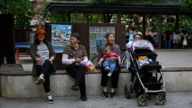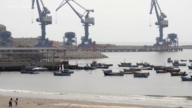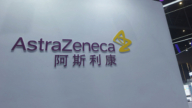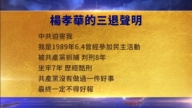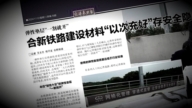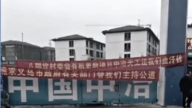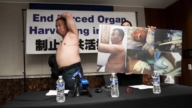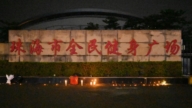【新唐人2013年07月29日訊】日前,《紐約時報》發表經濟學家保羅•克魯格曼的評論文章,文章指出,中國的「低消費高投資經濟」就是一種「龐氏騙局」。而且,中國經濟就像一架自行車,不前行就會倒下,現在中國這輛「龐氏自行車」正衝向一堵牆。
美國「普林斯頓大學」經濟系教授保羅•羅賓•克魯格曼(Paul Robin Krugman),是2008年的諾貝爾經濟學獎得主,他也是《紐約時報》的專欄作家。
克魯格曼指出,從某種程度上說,中國的「低消費高投資經濟」就是一種「龐氏騙局」。他舉例說,中國企業正在瘋狂投資,但不是用產能來服務消費者。實際上,現在在中國投資生產出來的產品,並無明確的最終買家。
多年從事中國經濟研究的美國資深經濟分析師簡天倫博士表示,中國經濟放緩後形成的鬼城、煤城,就是對克魯格曼說法的印證。
美國資深經濟分析師簡天倫:「中國的產能過剩非常嚴重,不管是電力、煤炭還有化工、鋼鐵都產能過剩。」
美國「南卡羅萊納大學」艾肯商學院教授謝田指出,中共這個「龐氏騙局」,對內表現在不斷製造股市、房地產升值,讓中國老百姓不斷把錢投進去,但錢卻被中共各級政府、太子黨、富二代、官二代賺走了。謝田說,中國的房地產只是個巨大的泡沫。
美國南卡羅萊納大學艾肯商學院教授謝田:「中共實際上對內、對外都在用龐氏騙局來騙中國人和外國人,龐氏騙局是它們一個保持經濟增長的湧動機,靠外商投資,靠壓榨中國農民工的血汗來維持中國經濟繁榮的假象。」
中共「龐氏騙局」對外則編織中國經濟所謂的大好形勢。謝田表示,中共利用中國巨大的市場、人數眾多做誘餌,不斷吸引西方國家投資,一旦西方先進的技術投資者進來後,它就鼓勵自己的民族產業去拷貝模仿,並排斥西方企業。
「谷歌公司」在中國的境遇說明了這一點。
克魯格曼還將中國的經濟比喻為一架自行車,他說,中國這架「自行車經濟」的特點就是,如果它不往前走就會倒地,而農村「可轉移勞動力」的日益枯竭,就是中國經濟即將撞上的那堵牆。
克魯格曼警告:中國的這輛「龐氏自行車」正在衝向一堵牆,而且這這隻「法西斯章魚」已經唱響了它的絕唱。
克魯格曼的文章還說,中共政權的說法是:它在建設社會主義的未來,實際上呢,它正在領導著一個裙帶資本主義的鍍金時代(Gilded Age)。那麼,這個政權的合法性又從何而來呢?主要是來自於經濟上的成功。如果這個方面出了問題,會發生甚麼?
簡天倫:「 中共政權的根基是甚麼?就是經濟發展。沒有經濟發展的話,他就沒有任何存在的基礎了,它唯一可以籠絡人心的就是把經濟GDP搞上去。」
不過,朱鎔基之子朱雲來,日前在電視媒體驚曝:中國居民實際收入10年來一直在下降。
而克魯格曼同時提出,從各種事實來看,中共這個獨裁政權滋生了極度的腐敗。
謝田認為,現在中國的老百姓已經不把中共當作一個人民的政府。而中共目前所謂的經濟發展,人們看到的只是權貴富起來了、資源被掠奪空了、環境被破壞了,所以一旦中國經濟泡沫破滅,必將民怨沸騰。加上中共內部的問題,最終,中共政權將被徹底的解體和摧毀。
採訪/易如 編輯/宋風 後製/蕭宇
Nobel Laureate: “China’s Ponzi Bicycle Is Running into a Brick Wall”
Recently, Economist Paul Krugman published
a commentary article in the New York Times.
In the article, he pointed out, “China’s low-consumption,
high-investment economy was a kind of Ponzi scheme.”
In addition, he described China’s economy as working
like a bicycle, “It falls over if it stops moving forward.”
Right now, China’s ponzi bicycle is running into a brick wall.
Paul Robin Krugman is a Professor of Economics
at Princeton University.
In 2008, Krugman won the Nobel Memorial Prize
in Economic Sciences.
He is also an op-ed columnist for the New York Times.
In his article, Krugman pointed out, “China’s
low-consumption, high-investment economy was a kind of Ponzi scheme.”
He also said, “Chinese businesses were investing
furiously not to build capacity to serve consumers who weren’t buying much,
but to serve buyers of investment goods —in effect,
investing to take advantage of future investment, adding even more capacity.
Would there ever be final buyers for what all this capacity
could produce? Unclear. So, a kind of Ponzi scheme.”
Dr. Jian Tianlun, distinguished American Economic Analyst,
has been dedicated to the study of China’s economy for years.
Dr. Jian said “ghost cities” and “dark cities” are
vivid proof of Krugman’s “Ponzi scheme” theory.
Jiang Tianlun: “Issues of capital excess in the electricity,
coal, and chemical industries are very severe in China.”
Xie Tian, Professor of Aiken Business School,
University of South Carolina, stated that
the Chinese Communist Party’s Ponzi scheme keeps
producing illusions of a rising stock market and housing markets
so that people continuously invest their money
in the market.
Nevertheless, the money that people have invested
ultimately went to all levels of the CCP’s governments, princelings, tycoons and officials.
Xie Tian also said China’s real estate market
is a huge bubble.
Xie Tian: “The CCP has been using a Ponzi scheme
to deceive Chinese people and international investors.
The Ponzi scheme is used as the engine
to push economic growth,
thus to create an illusion of economic prosperity
by exploiting the non-privileged group in China
and international investors.”
The Party’s Ponzi scheme fabricates a false
illusion of economic prosperity.
It has utilized China’s big population as bait
to attract international investment.
Once international investors with advanced
technologies are fooled and start investing in China,
the Party drives its national enterprises
to imitate the technologies and meanwhile rejects international businesses.
The experiences of Google in China have proved this point.
Krugman employed the bicycle metaphor
of China’s economy.
He said, “It’s a bicycle economy that falls over
if it stops moving forward.
And of course I’ve argued that running out
of peasants creates a wall.”
Krugman warned,” So, the Chinese Ponzi bicycle
is running into a brick wall.
Also, the fascist octopus has sung its swan song.”
Krugman also mentioned in his article,
“officially it’s building the socialist future,
in practice it’s presiding over a crony capitalist Gilded Age.
Where, then, does the regime’s legitimacy come from?
Mainly from economic success.
Let that success falter, and then what?”
Jian Tianlun: ”What is the foundation of the CCP’s regime?
It’s economic development.
Without it, it will lose any excuses for its existence.
The only way that the party tries
to win people’s report is to improve the GDP.”
Nonetheless, Zhu Yunlai, son of Zhu Rongji, delivered
a piece of shocking news to a TV station.
In the past 10 years, China’s residential income
has been decreasing all the time, he said.
Krugman also pointed out that the CCP’s dictatorship,
by all accounts, enables epic corruption.
Xietian stated that ordinary people in China don’t recognize
the CCP’s government as a people’s government anymore.
Based on the Party’s so-called economic growth,
people can only see that
the privileged groups have become wealthier,
that capital has been robbed, and that environment has been destroyed.
Once the bubble bursts, popular resentments will boil.
Along with the Party’s internal problems,
the CCP regime will completely collapse.


